
I can’t say it enough, I really enjoyed doing this. I wish I could have met Lewis in person. I have heard it said you should not meet your heroes. You are normally disappointed. I don’t believe that would have been true of Clive.
#16: That Hideous Strength
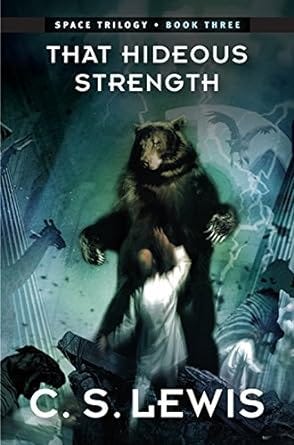
Ranking: 23.7 (out of 6)
Theological content 3.8
Readability 3.4
Character development 4.5
Originality 4.6
Cultural influence 3.0
Personal Engagement 4.4
Summary
In That Hideous Strength, we are introduced to Jane Studdock, a doctoral candidate, who is stuck in a lonely marriage to Mark Studdock, a Sociologist, who is a fellow at a prestigious college. Jane has been having terribly vivid dreams, growing in intensity every day. Mark is offered a position in NICE, whose organization had just purchased Bragdon Wood. NICE stands for the National Institute of Co-ordinated Experiments. In other words, NICE is a scientific entity, trying to remove the humanity from humans.
After being wooed and finally accepting a very ambiguous position in NICE, Mark begins to realize the nefarious agenda, a hideous strength, that is likely to damn his soul. During all of this, Jane is introduced to a therapist, who sends her to Ransom, formerly Dr. Elwin Ransom, who is now called the Director. Ransom is in tremendous pain, mainly from a wound on his heel that travelled with him from Perelandra (i.e. Venus). Good and evil are positioned against each other. The war is for the soul of Earth. Ransom is Head of the Light and the Deputy Director Wither is the Head of the Darkness.
But there is a third Head, trying to take over the world, technology. NICE is trying to use technology to create a new humanity, a naturalistic resurrection. Truly, if NICE succeeds, this hideous strength will win. Ransom and his associates fight back in this spiritual war and through a few unlikely characters, victory is secured. Jane becomes a Christian and reunites with her husband. Ransom heads back to Perelanda. The story ends.
Favorite quotes
“But don’t you see?,” broke in Camilla, “that you can’t be neutral? If you don’t give yourself to us, the enemy will use you.” (p. 112)
“Child,” said the Director, “it is not a question of how you or I look on marriage but how my Masters look on it.” (p. 146)
“In fighting those who serve devils one always has this on one’s side; their Masters hate them as much as they hate us. The moment we disable the human pawns enough to make them useless to Hell, their own Masters finish the work for us. They break their tools.” (p. 328)
Personal Musings
This was not only the last of the Space Trilogy, but this is the most disjointed, strange, manic of the three. The legendary Merlin makes an appearance, tapping into the world of dark magic, druids and the mysteries found in other worlds. Also, the scene where Wither and Frost are talking and then begin to sway, possessed by the demonic, is haunting. And finally, technology morphs into the focus, the newest god to try to replace the Creator. Immortality is the goal. Man-made resurrection is in reach. Now you don’t need the cross or Jesus of Nazareth.
#17: Surprised by Joy
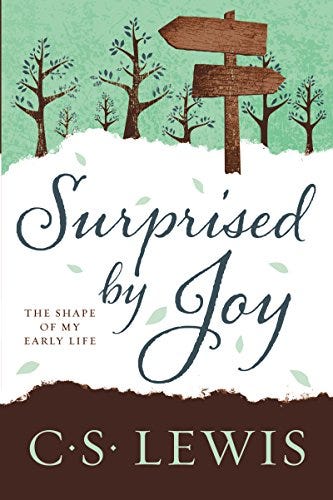
Ranking: 23.0 (out of 6)
Theological content 3.0
Readability 3.5
Character development 4.5
Originality 4.5
Cultural influence 3.5
Personal Engagement 4.0
Summary
This book is Lewis’ autobiography, focusing on his early years. He muses about the family dynamics, specifically losing his mother and the idiosyncrasies of his father. But the vast majority of the book is about his academic development, his instructors and the schools he attended. Finally, the last two chapters are about his conversion to Christianity, which happened (most would say) in 1931.
Favorite quotes
“But Christianity placed at the centre what then seemed to me a transcendental Interferer.” (p. 189)
“George MacDonald had done more to me than any other writer, of course it was a pity he had that bee in his bonnet about Christianity” (p. 245)
“The hardness of God is kinder than the softness of men, and His compulsion is our liberation.” (p. 263)
Personal Musings
Honestly, I thought I would enjoy this book a lot more than I did. I love biographies and autobiographies. But not this one. Lewis seems almost uncomfortable writing his biography. Furthermore, he focused way too much on his schooling, specifically his own academic institutions. For all of his literary strength, he just couldn’t grab my attention. The only saving grace was the last two chapters, detailing his conversion experience. Well, and I do enjoy getting to know the people that influenced Lewis. Chesterton and MacDonald were the main ones. Kind of disappointed in Lewis here.
#18: The Horse and His Boy
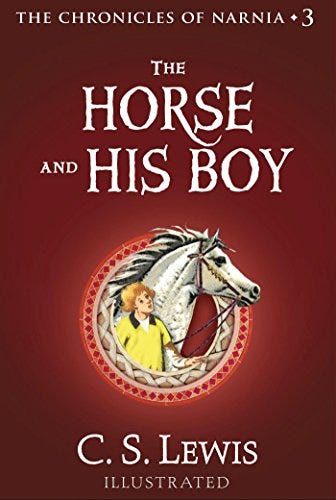
Rating: 22.7 (out of 6)
Theological content 3.5
Readability 4.3
Character development 4.3
Originality 4.0
Cultural influence 3.0
Personal Engagement 3.7
Summary
This story is set during the reign of High King Peter, Queen Susan, King Edmund, Queen Lucy. The story begins with two children, Shasta and Aravis, running away from their lives. Shasta, being on the threshold of being sold into slavery and Aravis, being forced to marry someone who she does not love. Both these children are looking for freedom and have been told that the land of Narnia is where freedom lies.
Shasta, with a desire to run away with his family horse, one day wished in jest that his horse could speak. Shockingly, the horse could speak. His name was Bree and he was born a free animal in Narnia, but was taken into slavery. Soon, Shasta met up with Aravis and she also had a talking horse named Hwin. Together they headed towards Narnia.
This story is set within the country of Calormen, a place that knows nothing of the magic of Narnia. Queen Susan is being courted by the prince of that country, yet she wants nothing to do with him. Because of this rejection, the Calormen attempt to conquer Narnia.
Ultimately, Shasta realizes his real name is Cor, he has a twin brother Corin and he was taken from his father, the King of Archenland, years before. Their reunion is sweet and in time, Cor becomes the King, marrying Aravis, his childhood friend.
Narnia defeats the Calormen and freedom is enjoyed by the two children and their horses. Everyone is free in Narnia.
Favorite quotes
“Child,” said the Voice, “I am telling you your story, not hers. I tell no one any story but his own.” (Aslan, page 84)
“Who are you?” asked Shasta. “Myself,” said the Voice, very deep and low so that the earth shook. (Shasta, page 84)
“It was I who wounded you,” said Aslan. “I am the only Lion you met in all your journeyings. Do you know why I tore you?” (Aslan, page 111)
Personal Musings
This was my least favorite of the Narnian books. The development of the story took too long and though I understand the reason for the existence of the Calormen and their place in the later Narnian books, it was not interesting to me. Furthermore, the main characters were somewhat bland. Bottom line, this work could be removed and it would take nothing away from the series.
#19: Till We Have Faces: A Myth Retold
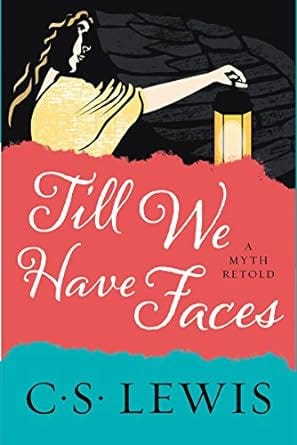
Rating: 22.4 (out of 6)
Theological content 1.5
Readability 4.6
Character development 4.7
Originality 4.3
Cultural influence 3.0
Personal Engagement 4.3
Summary
This is a story about three sisters, Orual, Redival and Psyche. But really this is a story about understanding and embracing who you really are. The King lost his wife, remarried and bore a child. He was hoping this child would be a boy, his heir, but alas he had another daughter. Orual, the oldest, is much like her father, but very ugly. Redival is immature, unintelligent and the King is just trying to marry her off. This story is a fiction, set in the time of the gods and goddesses. The goddess Ungit is the goddess of this time.
After Psyche (or Istra) is born, it is clear that the blood of the gods is within her. She is beautiful, a contrast to Orual, and is able to heal the people of Glome. Yet there is a prophecy, that a sacrifice must be made to appease the gods. Psyche, because she is without fault, is the only legitimate candidate to break the curse. Orual does her best to save Psyche, but the King, who is a terrible man, gladly allows Psyche to be sacrificed. It is later found out that Psyche is only drugged and released to the Grey Mountain, the place of the gods. Whether it is the drugs or a broken mind, Psyche believes that her husband is one of the gods, but she has never seen him and he won’t reveal his identity. Orual, to save her, resolves to kill her and herself, if necesary. Psyche, in grief, leaves heartbroken, to die of exposure in the cold winter.
Orual ascends to the throne, becoming her father and a version of the goddess Ungit. She is a strong Queen, but wears a veil, growing her legend. In the end, she reconciles in a vision with Psyche, her sister the goddess and comes to accept her own face, removing the veil in her final days.
Favorite quotes
“In the Great Offering, the victim must be perfect.” (p. 48)
“Father,” said I. “You are right. It is fit that one should die for the people.” (p. 61)
“To love, and to lose what we love, are equally things appointed for our nature. If we cannot bear the second well, that evil is ours.” (p. 85)
“I saw well why the gods do not speak to us openly, nor let us answer. TIll that word can be dug out of us, why should they hear the babble that we think we mean? How can they meet us face to face till we have faces?” (p. 294)
Personal musings
In the canon of Lewis, this work is unique. It is his only work of medieval fiction, detached from his typical theological focus. This work is beautiful and the character development, though not to the level of the Narnian chronicles, is still excellent. It is lower in my ratings, mainly because it offers nothing from a Christian perspective. I guess you could argue it holds some metaphysical value, but compared to the rest of his works, it is quiet. Orual is the main character and offers the most. The feminist will find a hero in her, but Lewis never bows to this agenda.
#20: God in the Dock: Essays on Theology and Ethics
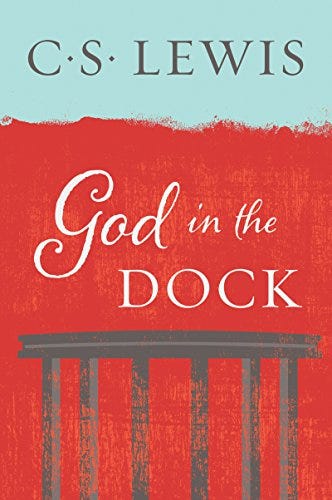
Rating: 18.8 (out of 5)
Theological content 4.0
Readability 3.8
Character development N/A
Originality 4.0
Cultural influence 3.0
Personal Engagement 4.0
Summary
These were essays and letters collected over 24 years. Lewis deals with topics like vivisection, war, capital punishment, the death of religion, etc. Most of the chapters are brief, to the point. Some essays are collected from Lewis’ other works. It is a helpful, but not substantial work.
Favorite quotes
“It is not Christianity which need fear the giant universe. It is those systems that place which place the whole meaning of existence on the weight of the biological or social evolution on our planet.” (p. 20)
“I didn’t go to religion to make me happy. I always knew a bottle of port would do that. If you want a religion to make you feel really comfortable, I certainly don’t recommend Christianity.” (p. 28)
“The wrong asceticism torments the self: the right kind kills the selfness. We must die daily: but it is better to love the self than to love nothing and to pity the self than to pity no one.” (p. 97)
Personal Musings
This is another book that after I read it again, I dropped it in my ratings. Without question, my favorite parts of the book were Part 1: Chapter 4 and Part 2: Chapter 16. Why? Because in these chapters Lewis is participating in a Q&A, unleashing his humor, which is rarely seen, and it is a joy to watch. It also contains his most practical insights, possibly in the entire canon of Lewis.
The other chapters worth a look are those that address capital punishment, just war and classic “God in the Dock” essay. This work would have been higher if I didn’t have to dig so hard to find the normal Lewis gems.
#21: Letters to Malcolm: Chiefly on Prayer
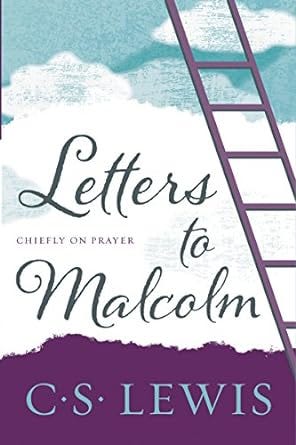
Ranking: 18.5 (out of 5)
Theological content 4.0
Readability 4.2
Character development N/A
Originality 3.5
Cultural influence 3.0
Personal Engagement 3.8
Summary
Lewis writes a series of letters to his imaginary friend, Malcolm. Malcolm seems to be more liberal or maybe progressive, in his Christian beliefs. These interactions bring up far more questions than answers. The reader will enjoy Lewis’ honest musings about prayer. He struggles like the rest of us to understand how an omniscient God genuinely answers prayer. Again, similar to his autobiography, Lewis does with rawness, bears his soul, seemingly forgetting of his status as a literary giant. Lewis proves his likeability.
Favorite quotes
“If grace perfects nature it must expand all our natures into the full richness of the diversity which God intended when He made them, and heaven will display far more variety than hell.” (p.18)
“A concentrated mind and a sitting body make for better prayer than a kneeling body and a mind half asleep.” (p.25)
“To forgive for the moment is not difficult. But to go on forgiving, to forgive the same offence again every time it recurs to the memory — there’s the real tussle.” (p. 38)
“Joy is the serious business of Heaven.” (p. 92)
“Emotional intensity in itself is no proof of spiritual depth.” (p. 116)
Personal Musings
I read this work a second time and admittedly, I found myself unhappy with it. I still appreciated Lewis’ struggles and humanness regarding prayer. But you have to be intellectually above average to track with his human musings. Lewis strives to write for the layman, but again, it is a layman who is not a spiritual infant. His chapter on the Lord’s prayer was excellent. I think it was because he attempted to exegete, even if he is lacking. A try from Lewis is far more refreshing than most offerings given by the common mortal.
Finally, Lewis dives into purgatory, because of the concept of praying for the dead. He is not convincing here, at least Protestants will not think so, but at least he begins to unravel the purification of purgatory, not exclusively the punitive aspect of purgatory. Certainly, they join hands, but it is the purification which Lewis holds the highest.
#22: The Pilgrim’s Regress
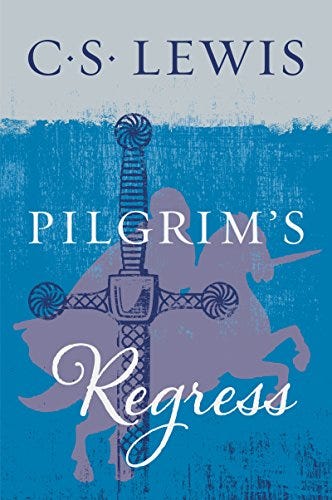
Rating: 22.3 (out of 6)
Theological content 4.4
Readability 3.2
Character development 3.5
Originality 4.4
Cultural influence 2.8
Personal Engagement 4.0
Summary
A man is dreaming about a man named John. This guy lives in a place called Puritania and begins on a journey looking for an island. Along the way, he joins a guy named Vertue. Both of these men question the existence of the Landlord (i.e. God) and they both are wrestling with the legitimacy of the Landlord’s rules. Along the way, John interacts with a variety of people. These people represent different philosophies and each one vying for John’s soul. The journey takes John and Vertue west and they face an impossible canyon, which cannot be crossed in their own strength. With the help of a man (i.e. Jesus), the men cross the canyon, heading towards their destination. John never finds an island, but he does find his way back home, his actual home, Puritania, with enlightened eyes. This is not a journey of conversion as much as a journey of deconstruction. Hence, the title of The Pilgrim’s Regress.
Favorite quotes
“Some have thought that all these loves were copies of our love for the Landlord.” (p. 134)
“I am afraid it is no use, mother,’ he said; ‘I cannot put myself under anyone’s orders. I must be the captain of my soul and the master of my fate. But thank you for your offer.” (p. 161)
“It seems to me, Father, that I am going where I do not wish; for I set out to find an Island and I have found a Landlord instead.” (p. 304)
“You all know,’ said the Guide, ‘that security is the mortals’ greatest enemy.” (p. 361)
Personal musings
Ten years after Lewis wrote this, he basically apologized for missing his audience and being a bit heavy-handed. Though I agree that he missed his audience, I don’t think he was heavy-handed. He missed his audience because he included statements of Latin and Greek. He assumed incorrectly that his audience was fluent in philosophy and most philosophical systems. That being said, I did appreciate what Lewis was trying to accomplish. He tried to take a page out of Bunyan’s playbook and was somewhat successful. But man, Lewis was raw here. Both in philosophy and theology. I wish he would have developed his thoughts more. He touched on WAY TOO MANY philosophical systems. If I hadn’t read The Great Divorce, I would have wanted Lewis to expand on his thinking regarding “the black hole” (i.e. Hell). Furthermore, I was fascinated with the character of Mother Kirk, which is the Church. Lewis placed her in a key spot, offering to lift the main characters out of the canyon. John and Vertue didn’t accept her offer, but what if they would have? And then diving into the water, which I assume is an allusion to baptism, is also interesting. Is Lewis saying that there is something (almost salvific) about baptism? Again, the immature thinking of Lewis may be to blame. This was an early work. He was just an infant in his faith.
I admit that I wanted this work to be higher on my list. Oh, and the grey boxes of authorial explanation did provide some help along the way. But the truth is, Lewis was right. He shot himself in the foot. This work had great potential, but it did not deliver.
#23: Reflections on the Psalms

Ranking: 15.2 (out of 5)
Theological content 3.6
Readability 3.0
Character development N/A
Originality 3.0
Cultural influence 2.1
Personal Engagement 3.5
Summary
This work of Lewis is given away in the title. Lewis is reflecting on the Psalms. In this work, he addresses themes like Judgment, Curses, Death, Beauty and Nature. Lewis is not attempting to be an exegete or a theologian. He writes as a Christian, doing his devotions. There is no pattern, no goal. There is no rationale for the Psalms he engages or neglects. Lewis simply has a desire to engage poetry in a practical way. Furthermore, it is not a complete work. Many themes are neglected. But somehow even an appetizer with Lewis as your chef, fills you up enough.
Favorite quotes
“We forgive, we mortify our resentment; a week later some chain of thought carries us back to the original offence and we discover the old resentment blazing away as if nothing had been done about it at all. We need to forgive our brother seventy times seven not only for 490 offences but for one offence.” (p. 36)
“Of all bad men religious bad men are the worst. Of all created beings the wickedest is one who originally stood in the immediate presence of God. There seems no way out of this. It gives a new application to Our Lord’s words about “counting the cost”.” (p. 44)
“It is difficult to know how an ancient Jew thought of Sheol. He did not like thinking about it. His religion did not encourage him to think about it. No good could come of thinking about it.” (p. 50)
“It looks as if God did not want the chosen people to follow that example. We may ask why. Is it possible for men to be too much concerned with their eternal destiny? In one sense, paradoxical though it sounds, I should reply, Yes.” (p. 54)
“The most valuable thing the Psalms do for me is to express that same delight in God which made David dance.” (p. 64)
“That is why we call him God’s Ape; he is always imitating God.” (p. 133)
Personal musings
This is why I read introductions, specifically those written by the author. In it, Lewis mentions purgatory, leading the reader to again wonder if this is what he believed in. The rest of the book was average, though with a few highlights tucked within. Chapter 3 is one of them. I hate to say this, but I almost wondered if Lewis had a little anti-semitism running through his veins. He accuses the Jews of being ungodly, hypocritical — worse than the pagans. I will say that chapter 4, his focus on death, is by far the most exegetically pleasing part within the book. He accurately depicts the ambiguity of the Hebraic thinking regarding the afterlife in the Old Testament. Lastly, Lewis attempts in the final chapters to slide into the issues surrounding interpretation, specifically how to understand the apparent double or spiritual or allegorical understanding of prophecy. Again, Lewis falls short in this section. Now of course he clarifies, giving himself an out, admitting his weakness. But this again is one of those times, I wish Lewis would attempt to put on the hat of an exegete or simply stop writing. He pushes on, leaving the reader wishing for more.
